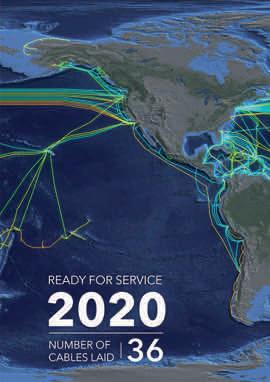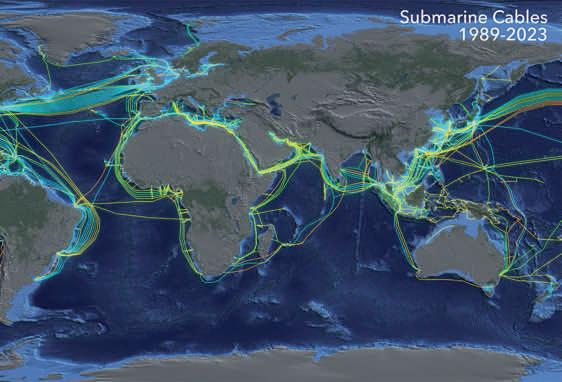
7 minute read
Building a Secure 5G Future
No.89/2020
BUILDING A SECURE 5G FUTURE
Advertisement
special section inside - LUXURY&LIFESTYLE TOP BRAND - pages 38 - 63
A 5G network is not just a communications network – it represents critical infrastructure for the 21st century economy. ADRIAN ZUCKERMAN, U.S. A MBASSADOR
BUILDING A SECURE 5G FUTURE
Huawei is the wrong way on 5G development. Contrary to popular marketing and public misconception, 5G is not synonymous with Chinese companies. American, European, and South Korean companies are leading the way on 5G development in markets around the world. 5G technology offers opportunity, but in the wrong hands, it threatens national security. As Secretary of State Mike Pompeo has said, competition with China challenges the basic freedoms that every one of us values.
BY ADRIAN ZUCKERMAN, U.S. AMBASSADOR
A 5G network is not just a communications network – it represents critical infrastructure for the 21st century economy. Much like a network of roads and highways helps move people and goods and unlock economic potential, future 5G networks will be highways and byways of the digital economy. We must ensure to use companies that continue to develop trustworthy 5G technologies, companies such as Ericsson, Nokia, Samsung, and Qualcomm. These companies are a solution to the threat we face from technology companies tied to the Chinese Communist Party.
Huawei, in contrast to these trustworthy companies, was charged last week by the U.S. Department of Justice with racketeering and conspiracy to steal trade secrets. As part of its decades-long scheme, Huawei paid bonuses to employees who stole confidential information from competitors in the United States. Unlike Western companies, Chinese technology companies are required to share information and technology with Chinese military or intelligence authorities. Chinese companies and their customers are never truly free from the oversight of the Chinese Communist Party. We cannot trust these companies to keep our networks secure and uphold our democratic values. In August 2019, the United States and Romania signed a memorandum of understanding that agreed on the threats posed by untrusted vendors. But it is not just the United States raising concerns: on January 29, the European Union called on Member States to exclude high-risk suppliers from critical parts of 5G networks.
There’s no safe place for Chinese companies in 5G networks. The only way to protect the security of 5G is to build it with companies we can trust. Allowing Chinese equipment into any part of a 5G network creates unacceptable risks to national security, critical infrastructure, privacy, and human rights. We look forward to working with our NATO Allies to build a strong, secure, and prosperous digital future that supports and defends our values and way of life.
5G SECURITY WHAT IS TRUST? BY U.S. MISSION ROMANIA
Countries need to be able to trust that 5G equipment and software companies will not threaten their national security, privacy, intellectual property, or human rights. Trust cannot exist where telecom vendors are subject to an authoritarian government, like the People’s Republic of China (PRC), that lacks an independent judiciary or rule of law that would prevent misuse of data. Trust means 5G equipment and software companies are not subject to control by an authoritarian government and have judicial recourse to successfully challenge government overreach. However, Huawei and ZTE, along with other Chinese companies, are secretly required to cooperate with Chinese intelligence services and security agencies. Trust means 5G equipment and software companies are financed openly and transparently using standard best practices in procurement, investment, and contracting. However, Huawei has benefited from subsidies, tens of billions in state-backed loans, and protected sales to operators within China, while being entangled in global corruption cases. Trust means 5G equipment and software companies have transparent ownership, partnerships, and corporate governance structures. However, Huawei refuses to reveal its corporate structure or explain its connections to the Chinese Communist Party. Trust means 5G equipment and software companies exemplify a commitment to innovation, respect for intellectual property rights, and a history of ethical corporate behavior. However, Huawei has a long and well-documented history of intellectual property theft. Trust means 5G equipment and software companies adhere to industry best practices on network security to promote a vibrant and robust supply of products and services. However, numerous technical reports document Huawei’s shoddy software and security practices. Trust means that 5G equipment and software companies do not break the law. However, Huawei is implicated in espionage on behalf of the People’s Republic of China, has stolen intellectual property from Western competitors, and is accused of corrupt practices throughout the world. How can such a company be trusted?
RUSSIAN INTELLIGENCE AGENTS REPORTEDLY WENT TO IRELAND TO INSPECT UNDERSEA CABLES, AND IT'S REIGNITING FEARS THEY COULD CUT THEM AND TAKE ENTIRE COUNTRIES OFFLINE
Russian intelligence agents have been sent to Ireland to make the precise locations of undersea cables connecting Europe to North America, and it's raising fears that they plan to tap or even cut them, The Sunday Times reported.
Irish security services believe that the agents were sent by Russia's foreign intelligence agency, the GRU, and are checking the fiber-optic cables for weak points, The Times also reported, citing police and military sources.
They were also seen monitoring Dublin Port, which prompted the country to ramp up security at a number of landing sites along the Irish coast, The Times reported. It's unclear where else the agents have been seen.
The vast network of transatlantic cables that run under the world's oceans power the internet, texts, calls, and global financial transactions. About 97% of all intercontinental data is transferred through these cables, according to the Asia-Pacific Economic Cooperation forum.
Ireland is an ideal location for these undersea maps, given its proximity to North America and Europe. In 2015, Irish telecommunications company Aqua Comms set up a $300 million cable to connect the US to Dublin, and on to London and European continent, the Irish Examiner reported. Irish police and military sources suspect the GRU is using Ireland as an operations base to gather intelligence on targets in the EU and the UK, The Times said.
Another reason for the Russians' presence could be Dublin's place as one of Europe's largest tech

hubs, as authorities suspect the agents could also be spying on large tech companies, according to The Times. Google, Airbnb, Facebook, and Twitter all have headquarters in the city.
The country also presents itself as an ideal target to the Russians, Mark Galeotti, an expert on transnational crime and Russian security at the Royal United Service Institute think tank, told The Times.
"Ireland doesn't have a counter-intelligence capability. It's a relatively soft target. Ireland is a major node for the global internet. It has a large concentration of tech companies," he said. "This is the new battle space of the future."
News of the Russian agents' arrival in Ireland has prompted concerns that Russia might ramp up its information warfare by cutting or tampering with the cables, which could disrupt global financial transactions or even take entire countries offline. John Sipher, a retired CIA officer, in Moscow, told The Times that there is a high chance the agents are either spying or planning to cut communications.
"They also may wish to show their capability in

order to threaten the West," he told the British newspaper. "Our FBI has caught Russians trying to gain access to underwater cables, including the areas where they come into land."
"They are also seeking to gain physical access to routers and communication nodes," Sipher added. Western countries have long feared that Russia could cut undersea cables and interfere with the global economy and way of life.
Air Chief Marshal Sir Stuart Peach, the UK's most senior military officer, said in December 2017: "There is a new risk to our way of life, which is the vulnerability of the cables that criss-cross the seabeds."
"Can you imagine a scenario where those cables are cut or disrupted, which would immediately and potentially catastrophically affect both our economy and other ways of living?"
WHAT ARE UNDERSEA INTERNET CABLES? More than 300 undersea cables, which run a total of 550,000 miles, keep the internet running around the world.
Most lines are owned by private telecommunications companies, including tech companies like Google and Microsoft. Their locations, which have been built up over the decades, can be easily identified on public maps. Despite their importance, little is being done to guard and protect these deep-sea cables. Cybersecurity experts told Business Insider's Jim Edwards in 2018 that it's only "a matter of time" before hackers can access these cables and entire countries can be taken offline.
MARK GALEOTTI

